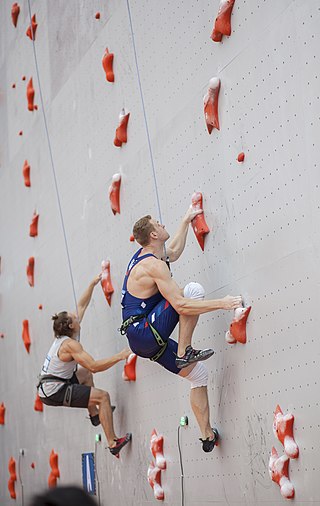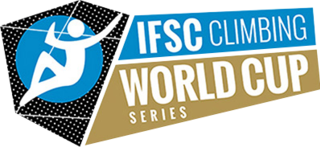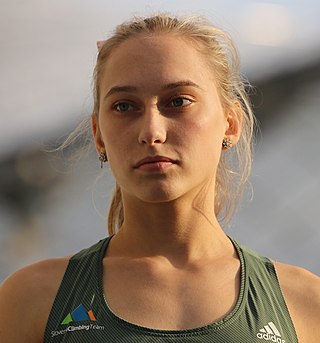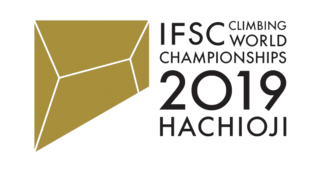
Speed climbing is a climbing discipline in which speed is the ultimate goal. Speed climbing is done on rocks, walls and poles and is only recommended for highly skilled and experienced climbers.

The IFSC Climbing World Cup is a series of competition climbing events held during the year at various locations around the world, organized by the International Federation of Sport Climbing (IFSC). At each event, the athletes compete in three disciplines: lead, bouldering, and speed. The number of events varies from year to year, and the winners for each discipline are decided by the points accumulated in the year.
Speed climbing competitions at the 2017 IFSC Climbing World Cup were being held at seven stops. The winners were awarded trophies, and the best three finishers received medals.
Speed climbing competitions at the 2018 IFSC Climbing World Cup were being held at eight stops. The winners were awarded trophies, and the best three finishers received medals.
The 2017 IFSC Climbing World Cup was held in 15 locations. Bouldering competitions were held in 7 locations, lead in 8 locations, and speed in 7 locations. The season began on 7 April in Meiringen, Switzerland and concluded on 12 November in Kranj, Slovenia.
The 2018 IFSC Climbing World Cup was held in 14 locations. There were 22 events: 7 bouldering, 7 lead, and 8 speed events. The season began on 13 April in Meiringen, Switzerland, and concluded on 28 October in Xiamen, China.
The 2015 IFSC Climbing World Cup was held in 13 locations. Bouldering competitions were held in 5 locations, lead in 7 locations, and speed in 5 locations. The season began on 17 May in Central Saanich, Canada and concluded on 15 November in Kranj, Slovenia.
The 2014 IFSC Climbing World Cup was held in 16 locations. Bouldering competitions were held in 8 locations, lead in 8 locations, and speed in 7 locations. The season began on 26 April in Chongqing, China and concluded on 16 November in Kranj, Slovenia.
The 2013 IFSC Climbing World Cup was held in 19 locations. Bouldering competitions were held in 8 locations, lead in 8 locations, and speed in 7 locations. The season began on 22 March in Chongqing, China and concluded on 17 November in Kranj, Slovenia.
The 2019 season of the IFSC Climbing World Cup was the 21st season of the competition. Bouldering competitions were held at six stops of the IFSC Climbing World Cup. The bouldering season began on April 5 at the World Cup in Meiringen, and concluded on June 8 with the World Cup in Vail. At each stop a qualifying was held on the first day of the competition, and the semi-final and final rounds were conducted on the second day of the competition. The winners were awarded trophies, and the best three finishers received medals. At the end of the season an overall ranking was determined based upon points, which athletes were awarded for finishing in the top 30 of each individual event.
The 2019 IFSC Climbing World Cup was held in 12 locations. Bouldering, lead and speed competitions were each held in 6 locations. The season began on 5 April in Meiringen, Switzerland with the first bouldering competition in the season, and concluded on 27 October in Inzai, Japan, with the last lead climbing competition in the season.

This is a ranking of total career IFSC victories obtained in the annual IFSC Climbing World Cup, and the biennial IFSC Climbing World Championships, which were organized by the International Climbing and Mountaineering Federation, and the International Federation of Sport Climbing.

The 2019 IFSC Climbing World Championships, the 16th edition, were held in Hachioji, Japan from 11 to 21 August 2019. The championships consisted of lead, speed, bouldering, and combined events. The paraclimbing event was held separately from 16 to 17 July in Briançon, France. The combined event also served as an Olympic qualifying event for the 2020 Summer Olympics.

Aleksandra (Ola) Mirosław is a Polish soldier and competition speed climber. She is a two-time women's speed world champion as well as the current women's competition speed climbing world record holder. Mirosław won the gold medal at the 2024 Summer Olympics in the speed climbing event, becoming the first ever Olympic champion in this event.
The 2021 IFSC Climbing World Cup was the 33rd edition of the international sport climbing competition series, held in seven locations. There are 11 events: four bouldering, five lead, and two speed events. The season began on 16 April in Meiringen, Switzerland with the first bouldering competition in the season, and concluded on 4 September in Kranj, Slovenia. The International Federation of Sport Climbing had initially scheduled 18 events concluding on 31 October, but COVID-19 travel restrictions resulted in the cancellation of events in Xiamen and Wujiang in China, Jakarta in Indonesia and Seoul in South Korea.
The 2021 season of the IFSC Climbing World Cup was the 22nd season of the competition. Bouldering competitions will be held at six stops of the IFSC Climbing World Cup. The bouldering season began on April 16 at the World Cup in Meiringen, and concluded on 26 June with the World Cup in Innsbruck. The International Federation of Sport Climbing had initially scheduled six bouldering events concluding on 24 October, but COVID-19 travel restrictions resulted in the cancellation of events in Wujiang in China and Seoul in South Korea.
Competition speed climbing in the 2019 IFSC Climbing World Cup was held over six stages at six different locations, from 12 April to 20 October 2019. The top three in each competition received medals, and at the end of the season, the overall winners were awarded trophies. The overall winners were determined based upon points, which athletes were awarded for finishing in the top 30 of each individual event. Bassa Mawem won the men's seasonal title, YiLing Song won the women's seasonal title, and Russian Federation defended its national team title.
Speed climbing competitions at the 2021 IFSC Climbing World Cup are being held at two locations, from 28 May to 3 July 2021. The International Federation of Sport Climbing had originally scheduled six speed climbing events concluding on 31 October, but COVID-19 travel restrictions resulted in the cancellation of events in Xiamen and Wujiang in China, Jakarta in Indonesia and Seoul in South Korea.
The 2023 IFSC Climbing World Cup is the 35th edition of the international competition climbing series organized by the International Federation of Sport Climbing (IFSC), held in 12 locations. There are 18 events: six bouldering, six lead, and six speed events. The series begins on 23 April in Hachioji, Japan with the first bouldering competitions of the season, and concluded on 24 September in Wujiang, China.
The 2024 IFSC Climbing World Cup is the 36th edition of the international competition climbing series organised by the International Federation of Sport Climbing (IFSC), held in 9 locations. There are 16 events per gender: five competition bouldering, six competition lead climbing, and five competition speed climbing events. The series begins on 8 April in Keqiao, Shaoxing, China, with the first bouldering World Cup of the season, and will conclude on 8 October in Seoul with bouldering, lead, and speed.





